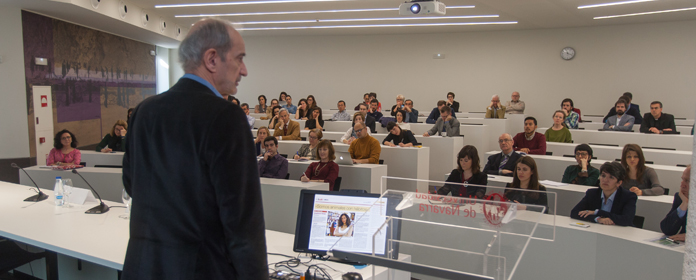"We become alive through dead words."
Sorbonne University professor Dominique Maingueneau spoke at the IV ICS Lecture on the circulation of sentences without context.

PHOTO: Manuel Castells
"The living indicate that they are right with arguments that a dead man said before them. The paradox is that we become alive through dead words". So said Dominique Maingueneau, professor of linguistics at the University of Paris-La Sorbonne, who gave the IV ICS Lecture on Humanities and Social Sciences at the University of Navarra. Institute for Culture and Society of the University of Navarra.
In his lecture, entitled 'Living word, dead word: sentences without text', the expert analyzed a common phenomenon, especially in the media: the circulation of single sentences that stand out, without the original context in which they were produced. This is the case of quotations in quotation marks in headlines, slogans, aphorisms...
Along with this, there is another form of verbal production from texts: superenunciations, generated from a set of writings. This is what happens with the complete works of a writer, which are actually created by a third party.
In both cases, Professor Maingueneau has distinguished two linguistic subjects, the speaker and the aphorizer. The former is the person who pronounced the speech to which the sentence belonged, while the latter is a new being who speaks to a community beyond the immediate addressees. In a article, for example, the speaker addresses the journalist; when the latter puts his words in quotation marks, the quotation"speaks to humanity," he has assured.
The Sorbonne professor stressed that in this way, even if the speaker's speech ends, the being who utters that sentence - the aphorizer - continues to exist.
Ordinary and extraordinary wordsAccording to him, this phenomenon is related to the capacity of human beings to produce ordinary and extraordinary words: "When they were said, they came from normal texts. Now they circulate in a kind of heaven and are considered extraordinary because we make them so," he said.
As an example, he mentioned Martin Luther King's 'I have a dream' which, in its original speech , was a rhetoricalresource (anaphora) to improve his argument. Today it has become a symbol of the life of its author.
In his opinion, the trend towards 'sentences without text' is on the rise, since the direct speech and the absence of mediation are valued. He pointed out that this can be seen in newspaper headlines, which often consist of direct quotations in quotation marks.
Maingueneau has recalled that the phrase has an "extraordinary power" and criticized the lack of ethics of those who highlight a quotation without respecting the original meaning of its context. "Outside of this there is no strategy, audience or argumentation, so the reader can imagine what he wants." In this regard, he recalled that in France, the courts condemn sentences, not texts.
Manipulation and populismIn this framework of manipulation, asked about the populist speech , Maingueneau maintained that it exists as a reaction to other discourses: "It is a couple, populists and political elite, and both justify themselves to each other". He explained it with the case of Marine Le Pen and Le Monde or Donald Trump and the New York Times. He has admitted that these newspapers criticize them on a daily basis "to show that they are an elite newspaper that despise this subject of people". For their part, when politicians "talk about the elite newspapers, they say that they ignore the problems of ordinary people".
Finally, Professor Maingueneau commented that since the Second World War and with the appearance of television there has been a "profound transformation in the relationship we have with verbal production". He emphasized that "the word is not enough" and to show this he contrasted the newspapers of a century ago, in which information was arranged in columns composed of a mass of text, with those of this era, in which "language is more multimodal; readers need images, subtitles, colors...".




